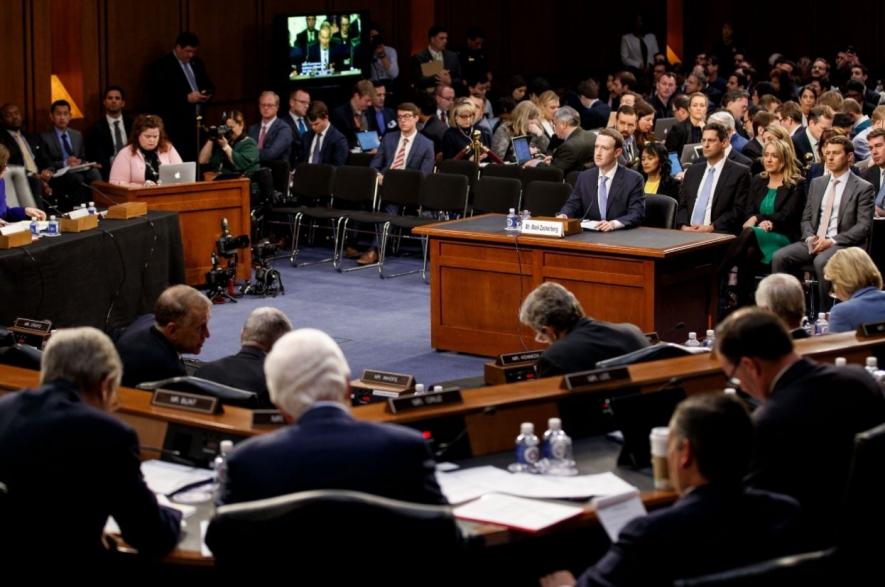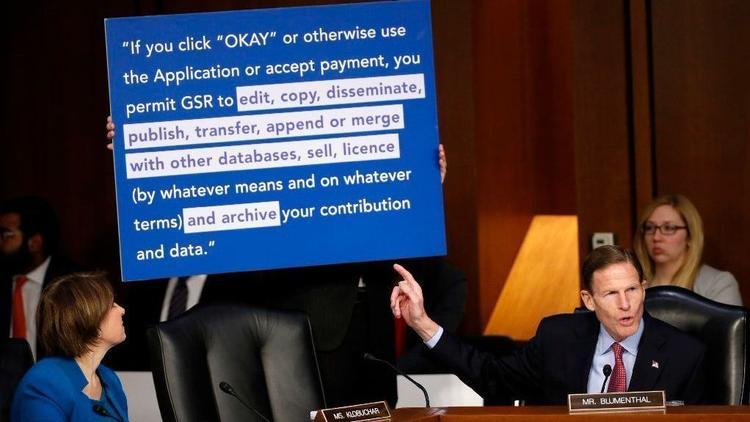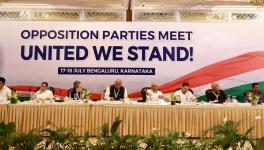Mark On the Stand Aka The Art Of Saying Nothing

Facebook CEO Mark Zuckerberg testifies at a joint hearing of the Senate Judiciary and Commerce committees
Through most of 2017, Facebook CEO Mark Zuckerberg was implementing his resolution for the year - visiting States in the US he had not been to so far and “listening and learning about how more people are living, working and thinking about the future”. The journey, a publicist’s dream come true, even raised speculation about his contesting for President. Over the last few weeks, however, Zuckerberg was on a very different trip - an ‘apology tour’ - as he gave a series of contrite interviews to media organisations admitting his error in the aftermath of the Cambridge Analytica scandal, which saw the data of nearly 87 million users worldwide being sold. The tour culminated in Zuckerberg’s appearance on April 10-11 before committees of the US Senate and the House Representatives to answer questions on the scandal and associated issues.
Except for the spectacle, the proceedings produced precious little though. If anything, they demonstrated the difficulties governments have in dealing with corporate data giants such as Facebook. From the format of the hearings, which gave Representatives from Congress and Senators few opportunities for detailed follow-ups to the fact that many of Zuckerberg’s interlocutors had little idea of the basic business model of Facebook, the hearings often swung between generalities and technicalities that produced no concrete outcome. In fact, it has been pointed out, on many occasions, Zuckerberg was treated more like a respected equal whose views were being actively sought than someone under whose watch such a huge sale of data had taken place. Facebook’s stock also soared by 4.5% by the end of the first hearing.
Throughout the hearing, Zuckerberg continued to conflate the options users have regarding who gets to see their posts on Facebook with control over their data Facebook collects. When pushed further on this, his stand was “You don’t have to put anything up in the first place if you don’t want” - an argument that puts the onus of data security on the user.
You wouldn't know it from Zuck's testimony, but there is a big difference between controls for sharing data ON Facebook and controls for sharing data WITH Facebook.
— Jennifer Valentino-DeVries (@jenvalentino) April 11, 2018
Zuckerberg was similarly non-committal about issues such as shadow profiles (data collected about users not on Facebook), information collected after logging out of Facebook and data collected by Facebook tools on other sites.
On Cambridge Analytica, Zuckerberg took the expected line of apologising while describing it as an error of good faith. Facebook’s mistake, according to him, was trusting Cambridge Analytica when it said it had deleted the data harvested. Senator Richard Blumenthal confronted him with a copy of the terms and conditions of the app developed by Alexander Kogan which explicitly stated that the data of users could be sold. Blumenthal also accused Facebook of violating a consent agreement with the Federal Trade Commission (FTC), which required it to report threats to the data of users.

The FTC is currently investigating both the Cambridge Analytica scandal and the use of Facebook search tools to extract data and may end up levying a hefty fine on the company. However, at the hearing Zuckerberg stuck to his position that the agreement with the FTC was not violated.
On the issue of regulation, Zuckerberg stopped short of fully endorsing the European Union’s General Data Protection Regulation (GDPR) that is set to come into force on May 25 and is seen as among the strongest such laws in place. Zuckerberg’s replies on extending the protections outside Europe got drowned in detail and as yet, clarity is yet to emerge on the issue. The GDPR permits companies such as Facebook to process user data only after receiving their explicit consent and also widens the scope of data itself. It also offers users the possibility of data portability, which gives them a clearer idea of the data a company has access to, and the right to be forgotten.
The GDPR is a positive step but despite its wide applicability, it comes nowhere close to solving the problem of Facebook, which is a global behemoth and is making huge inroads into Asia and Africa. Facebook’s Free Basics operation, which seeks to ensure more internet connectivity to people across the globe, was being used by nearly 40 million in nearly 25 countries in late 2016. Studies show that many Facebook users in such countries are unable to make a distinction between Facebook and the larger internet. It is an open question whether the controls proposed by Zuckerberg will have an impact in such countries or even in places like India, which has flimsy data protection laws and a government that has tended to be extremely friendly to the company.
It is a given by now that the problem fundamentally lies with the business model of the data giants, who manage to get away with unethical and illegal practices time and again. Zuckerberg’s long history of apologies and the lack of consequences itself is an excellent demonstration of this. Time and again, movements have broken out to encourage users to leave Facebook or build alternatives. There have been suggestions too of business models that do not extract any non-vital data on principle. While these initiatives do mark a departure from business as usual, the question of companies that monopolise the market in their respective areas through large scale extraction and manipulation of data remains. During his hearing at the Senate, Zuckerberg when asked about whether Facebook was a monopoly said that he didn’t think so - an answer that defies comprehension. Unless governments, regulators and activists actively confront the issue of monopoly in sectors associated with data, there is little chance that tweaks in design or idealistic privacy statements alone will solve these challenges at a global level.
Get the latest reports & analysis with people's perspective on Protests, movements & deep analytical videos, discussions of the current affairs in your Telegram app. Subscribe to NewsClick's Telegram channel & get Real-Time updates on stories, as they get published on our website.























